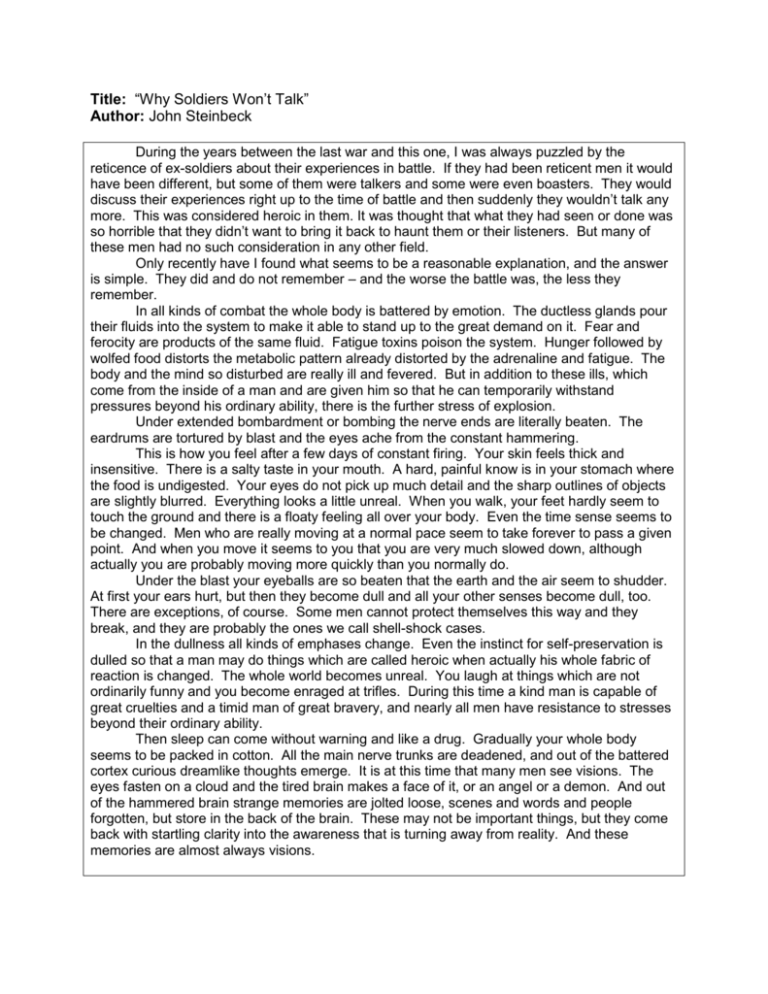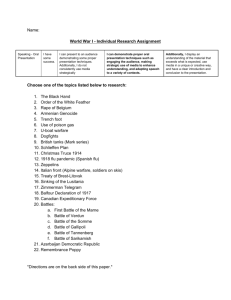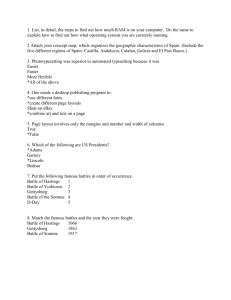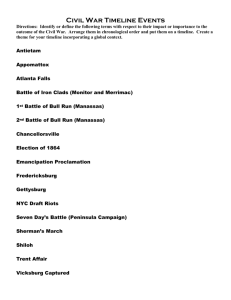Title: “Why Soldiers Won't Talk” Author: John Steinbeck
advertisement

Title: “Why Soldiers Won’t Talk” Author: John Steinbeck During the years between the last war and this one, I was always puzzled by the reticence of ex-soldiers about their experiences in battle. If they had been reticent men it would have been different, but some of them were talkers and some were even boasters. They would discuss their experiences right up to the time of battle and then suddenly they wouldn’t talk any more. This was considered heroic in them. It was thought that what they had seen or done was so horrible that they didn’t want to bring it back to haunt them or their listeners. But many of these men had no such consideration in any other field. Only recently have I found what seems to be a reasonable explanation, and the answer is simple. They did and do not remember – and the worse the battle was, the less they remember. In all kinds of combat the whole body is battered by emotion. The ductless glands pour their fluids into the system to make it able to stand up to the great demand on it. Fear and ferocity are products of the same fluid. Fatigue toxins poison the system. Hunger followed by wolfed food distorts the metabolic pattern already distorted by the adrenaline and fatigue. The body and the mind so disturbed are really ill and fevered. But in addition to these ills, which come from the inside of a man and are given him so that he can temporarily withstand pressures beyond his ordinary ability, there is the further stress of explosion. Under extended bombardment or bombing the nerve ends are literally beaten. The eardrums are tortured by blast and the eyes ache from the constant hammering. This is how you feel after a few days of constant firing. Your skin feels thick and insensitive. There is a salty taste in your mouth. A hard, painful know is in your stomach where the food is undigested. Your eyes do not pick up much detail and the sharp outlines of objects are slightly blurred. Everything looks a little unreal. When you walk, your feet hardly seem to touch the ground and there is a floaty feeling all over your body. Even the time sense seems to be changed. Men who are really moving at a normal pace seem to take forever to pass a given point. And when you move it seems to you that you are very much slowed down, although actually you are probably moving more quickly than you normally do. Under the blast your eyeballs are so beaten that the earth and the air seem to shudder. At first your ears hurt, but then they become dull and all your other senses become dull, too. There are exceptions, of course. Some men cannot protect themselves this way and they break, and they are probably the ones we call shell-shock cases. In the dullness all kinds of emphases change. Even the instinct for self-preservation is dulled so that a man may do things which are called heroic when actually his whole fabric of reaction is changed. The whole world becomes unreal. You laugh at things which are not ordinarily funny and you become enraged at trifles. During this time a kind man is capable of great cruelties and a timid man of great bravery, and nearly all men have resistance to stresses beyond their ordinary ability. Then sleep can come without warning and like a drug. Gradually your whole body seems to be packed in cotton. All the main nerve trunks are deadened, and out of the battered cortex curious dreamlike thoughts emerge. It is at this time that many men see visions. The eyes fasten on a cloud and the tired brain makes a face of it, or an angel or a demon. And out of the hammered brain strange memories are jolted loose, scenes and words and people forgotten, but store in the back of the brain. These may not be important things, but they come back with startling clarity into the awareness that is turning away from reality. And these memories are almost always visions. And then it is over, you can’t hear but then there is a rushing sound in your ears. And you want to sleep more than anything, but when you do sleep your mind is uneasy and crowded with figures. The anesthesia your body has given you to protect you is beginning to wear off, and, as with most anesthesia, it is a little painful. And when you wake up and think back to things that happened they are already becoming dreamlike. Then it is not usual that you are frightened and ill. You try to remember what it was like, and you can’t quite manage it. The outlines in your memory are vague. The next day the memory slips farther, until very little is left at all. A woman is said to feel the same way when she tries to remember what child birth was like. And fever leaves this same kind of vagueness on the mind. Perhaps all experience which is beyond bearing is that way the system provides the shield and removes the memory, so that a woman can have another child and a man can go into combat again. It slips away so fast. Unless you made notes on the spot you could not remember how you felt or the way things looked. Men in prolonged battle are not normal men. And when afterward they seem to be reticent-perhaps they don’t remember very well.








